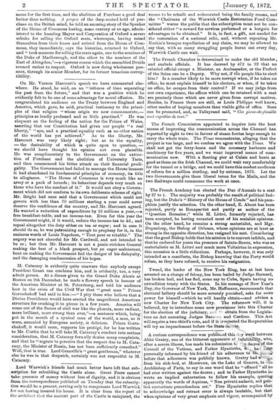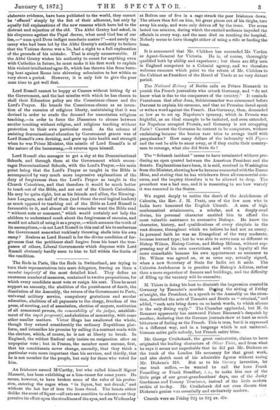A curious correspondence was pubhseed this nay ek between Abbe
Gratry, one of the bitterest opponents ey Infallib y, who, after a severe illness, has made his submission to "42 decree cf the
Council of the Vatican, and Father Hyacinthe, had b personally informed by his friend of his adherence tO Ife.sleeree before that adherence was publicly known. Gratry had ti-1N-- from his sick-bed, at Montreux, on the Lake of Geneva, to Archbishop of Paris, to say in one word that he " effaced " all he had ever written against the decree ; and to Father Hyacinthe he wrote an implied exhortation to follow his example, quoting apparently the words of Aquinas, " Non privates andacia, tied pub- lics auctoritate procedendum eat." Pere Hyacinthe replies that to acknowledge and retract error is always laudable, but that when opinions of very great emphasis and vigour, accompanied by
elaborate evidence, have been published to the world, they cannot be effaced' simply by the fiat of their adherent, but only by equally full explanations of the new reasons which have led to the distrust and rejection of the old. The Abbe Gratry had asked, in his eloquence against the Papal decree, what need God has of our lies,—" num quid Deus indiget mendacio nostro ?"—and surely the many who had been led by the Abbe Gratry's authority to believe that the Vatican decree was a lie, had a right to a full explanation of the grounds of his mistake. That is simply unanswerable. If the Abbe Gratry wishes his authority to count for anything even with Catholics in future, he must make it his first work to explain this violent intellectual ague-fit, which has thrown him from burn- ing heat against Rome into shivering submission to her within so very short a period. However, it is only fair to give the poor man time to get well first.











































 Previous page
Previous page